In 2023, Libya endured one of the most devastating disasters in its history as Storm Daniel ravaged the country, causing the death of thousands and the destruction of entire cities. While other nations in the region faced the same storm, none suffered as deeply as Libya. The reasons for this immense devastation lie in a toxic combination of corruption, weak infrastructure, and the government’s failure to prepare for the worst.
For decades, corruption has been at the heart of Libya’s infrastructure failures, and this disaster laid bare the tragic consequences. Projects meant to protect coastal cities from flooding were either left incomplete or executed with poor quality. Even the few projects that were finished had been neglected, with essential maintenance long overdue. These failures left cities exposed to the full force of the storm.
Investigations have revealed that corruption played a central role in Libya’s vulnerability. Massive sums of public money, intended for infrastructure and flood defenses, were siphoned off through fraudulent contracts or diverted to illegal financial activities. As a result, critical projects were abandoned or poorly constructed, leaving the country defenseless against natural disasters.
Libya’s unpreparedness extended beyond infrastructure. The government’s emergency systems failed to function properly, with authorities delaying evacuation efforts and failing to activate early warning systems. This slow response dramatically increased the death toll. According to United Nations estimates, over 11,000 people were killed, with many more still missing. Had evacuation orders been issued promptly, many lives could have been saved.
Derna, a city in eastern Libya, was the worst affected by the storm. Two dams, built to protect the city from floods, collapsed under the immense pressure of the rainfall. These dams, constructed decades ago, had not undergone maintenance in years. When they failed, entire neighborhoods were washed away, with thousands of residents swept into the Mediterranean Sea. By the end of October, reports confirmed over 4,352 deaths in Derna alone, with 8,500 people still unaccounted for and 43,400 displaced.
In the aftermath, Libya’s Public Prosecutor launched a wide-ranging investigation into the causes of the disaster, focusing on the role of corruption and mismanagement in the failure of infrastructure projects. Sixteen officials, including former Derna Mayor Abdulmenam Al-Ghaithi, were arrested. These officials were charged with neglecting their duties, mismanaging public funds, and failing to maintain critical infrastructure, which directly contributed to the loss of life and widespread destruction.
Al-Ghaithi, in particular, was accused of misusing public funds intended for the development and safety of Derna. His failure to allocate resources for the upkeep of the dams and flood defenses led to the collapse that claimed thousands of lives. The Public Prosecutor, Al-Siddiq Al-Sour, emphasized that these officials had failed in their most basic responsibilities, neglecting to take the necessary precautions to protect citizens from natural disasters.
The storm has drawn attention to Libya’s broader governance issues, highlighting the devastating impact of corruption and administrative chaos. While other countries in the region weathered the storm with far less damage, Libya’s fragile infrastructure and dysfunctional institutions made it uniquely vulnerable. Years of political instability have weakened the country’s ability to manage crises, leaving it ill-equipped to deal with disasters of this magnitude.
The collapse of the Derna dams was a particularly stark example of Libya’s infrastructure problems. These dams had been built decades earlier, to protect the city from flash floods. However, despite repeated warnings and the allocation of funds for their maintenance, they had not been repaired or updated. Evidence suggests that the contracts for their upkeep were part of a broader pattern of corruption, with funds either misused or siphoned off, leaving the dams in a state of disrepair.
The disaster has intensified calls for reform in Libya. Experts have warned that unless the country takes serious steps to combat corruption and rebuild its institutions, it will remain vulnerable to future disasters. The tragedy of Storm Daniel has underscored the urgent need for transparent governance, strong institutions, and the proper use of public funds to protect citizens from the next inevitable crisis.


